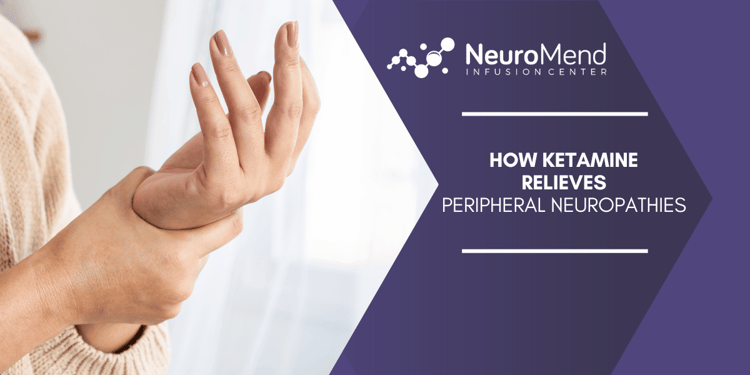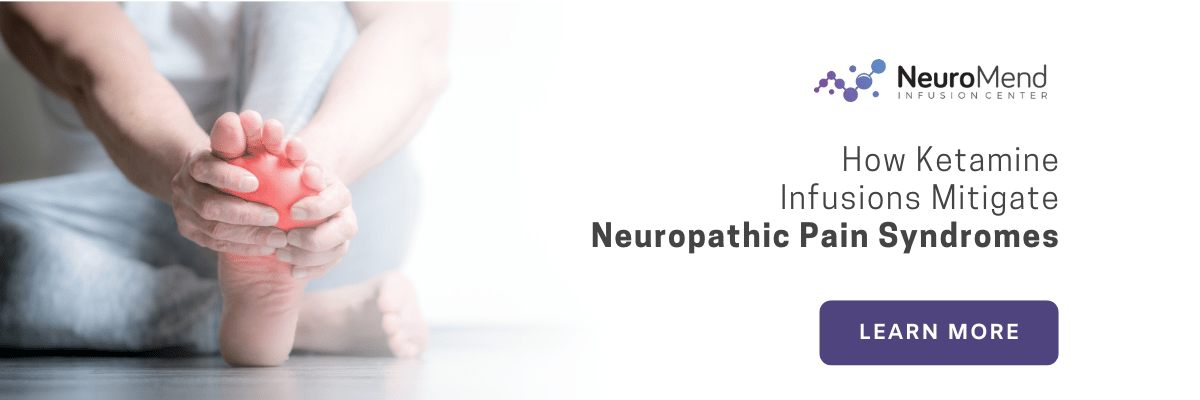
Ketamine's therapeutic potential extends beyond its established role in aiding Treatment Resistant Depression. Recent research has unveiled its efficacy in addressing chronic pain conditions, marking a significant breakthrough in pain management strategies.
Among the myriad of pain modalities, Ketamine exhibits promise in alleviating the suffering associated with Peripheral Neuropathies, a debilitating condition characterized by nerve damage that often leads to persistent, agonizing pain.
Keep reading to discover just how Ketamine can help relieve peripheral neuropathy pain and if you are suffering from any of these chronic pain issues, how you can possibly find relief as well.
What Is Peripheral Neuropathy Pain?
Peripheral neuropathy pain refers to discomfort, tingling, numbness, or weakness that arises from damage to the peripheral nerves, which are the nerves outside the brain and spinal cord. These nerves transmit messages between the body, the spinal cord, and the brain, allowing for sensation and movement control.
Peripheral neuropathies Origins
Peripheral neuropathy pain can be chronic in nature and stem from any of the following origins:
-
Diabetes: Diabetic neuropathy is one of the most common causes of peripheral neuropathy. Prolonged high blood sugar levels can damage nerves over time.
-
Infections: Certain viral or bacterial infections, such as shingles, Lyme disease, or HIV/AIDS, can lead to peripheral neuropathy.
-
Trauma: Injuries, accidents, or surgeries can damage peripheral nerves, leading to neuropathic pain.
-
Toxins: Exposure to certain toxins, including heavy metals, chemicals, or chemotherapy drugs, can cause nerve damage.
-
Autoimmune diseases: Conditions such as rheumatoid arthritis, lupus, or Guillain-Barré syndrome can trigger autoimmune responses that damage peripheral nerves.
-
Genetic factors: Some individuals may inherit conditions that predispose them to peripheral neuropathy.
- Nerve compression: Compression of nerves due to factors such as repetitive motion, poor posture, or the presence of tumors or cysts can lead to peripheral neuropathy. (such as Carpal Tunnel)
How Is Peripheral Neuropathy Pain Usually Treated?
Peripheral neuropathy pain is typically managed through a combination of approaches aimed at addressing the underlying cause, alleviating symptoms, and improving overall quality of life. Treatment strategies may vary depending on the severity of symptoms, the specific type of neuropathy, and individual patient needs.
Often, in conventional medicine, this type of pain is often dealt with by prescribing opioids for pain relief, NSAIDs, or Gabapentin to attempt and dampen the pain response.
If left untreated, though, usually patients will require more mg of medication or require medication more often as their bodies continue to acclimate to the response of the medication.
Common approaches to treating peripheral neuropathy pain include:
-
Medications
-
Physical therapy
-
Lifestyle modifications
-
Complementary and alternative therapies
-
Interventional procedures
It's important for individuals with peripheral neuropathy pain to work closely with healthcare professionals to develop a comprehensive treatment plan tailored to their specific needs and preferences. Regular monitoring and adjustments to the treatment regimen may be necessary to optimize pain relief and functional outcomes while minimizing potential side effects and complications.
How Does Ketamine Help Treat and Relief Neuropathic Pain?
Understanding the mechanism behind Ketamine's effectiveness in treating pain is crucial. Ketamine, traditionally recognized as an anesthetic and dissociative agent, operates by modulating glutamate receptors in the brain, thereby altering pain perception and transmission. This unique pharmacological action offers a novel approach to managing neuropathic pain, which often proves resistant to conventional pain relievers.
Research findings indicate that Ketamine's therapeutic benefits extend beyond its anesthetic properties. By targeting NMDA receptors, Ketamine not only dampens pain signals but also exerts neuroprotective effects, potentially mitigating the underlying neuropathic processes contributing to chronic pain.
Moreover, Ketamine's rapid onset of action and relatively long duration make it an attractive option for individuals grappling with debilitating neuropathic pain. Unlike traditional pain medications, which may require titration and often fail to provide adequate relief, Ketamine offers a promising alternative with the potential for rapid and sustained pain reduction.
What Are Some Types of Neuropathic Pain That Ketamine Can Help?
If medications and non-pharmacological interventions do not provide pain relief, IV ketamine therapy may be a treatment option.
Similar to depression, IV ketamine is known for its ability to help relieve medication-resistant chronic pain syndromes, especially those syndromes that have a neuropathic component, such as:
-
Postherpetic neuralgia
-
Peripheral Neuropathies
- Chemotherapy-Induced Neuropathy
NEUROMEND: EFFECTIVE TREATMENT SOLUTIONS
While research continues to discover and test effective treatment for Peripheral Neuropathies, Ketamine Infusions are showing promise with their current efficacy in providing relief for many patients.
At Neuromend, our advanced Ketamine protocols have transformed the lives of countless patients, helping them regain their footing and achieve optimal well-being. Contact us today to learn more about our ketamine infusion therapy treatment options or to schedule a free consultation.
ABOUT NEUROMEND INFUSION CENTER
 We are an Evidence-Based Center of Excellence and the leading provider of Ketamine Infusions, IV Infusions and Ketamine Consulting Services for Ketamine Clinics and IV Therapy Clinics.
We are an Evidence-Based Center of Excellence and the leading provider of Ketamine Infusions, IV Infusions and Ketamine Consulting Services for Ketamine Clinics and IV Therapy Clinics.
We Provide Effective Treatment For The Following Conditions: Major Depressive Disorders, Post-traumatic Stress Disorder (PTSD), Bipolar Depression, Obsessive Compulsive Disorder (OCD), Chronic Migraines, and Severe Anxiety.











